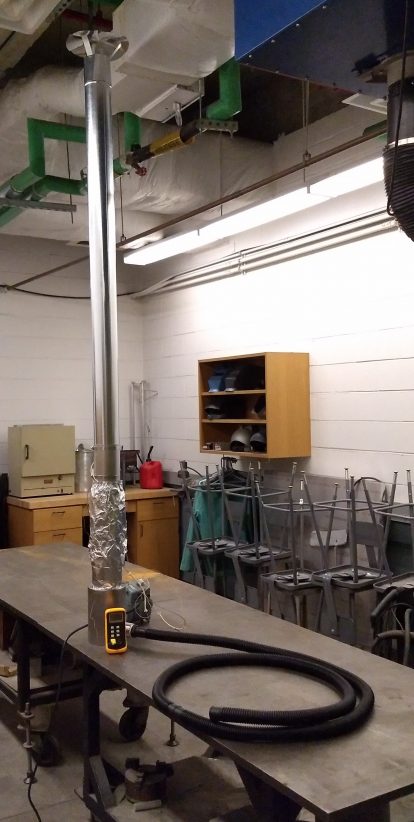
Physics Machine Shop Building Device to Protect Health Workers
While many spots on campus sit empty, the Department of Physics’ Machine Shop is up and running to aid in an important effort to protect health care workers.
Working with collaborators from across the campus, the Machine Shop is building a prototype for a device that would decontaminate the atmosphere around COVID-19 patients during procedures that pose a heightened risk to health providers.
For example, when a patient’s breathing tube is removed, the patient tends to cough and spread the virus around the room. To prevent this, the decontamination unit would pump the atmosphere from a transparent box around the patient’s head through a zone that deactivates the virus, before sending the air back into the environment.

“By using an enclosure or tent around the patient and pumping that locally contained atmosphere through the decontamination unit, we hope to reduce the atmospheric viral load to which health care workers are exposed, reducing the risk that the attending staff become infected,” said ANDREW G. RINZLER, physics professor and the chair of the department’s Technical Operations Committee.
Rinzler, Machine Shop supervisor BILL MALPHURS, and Machine Shop staff JOSH LINSCOTT and JOHN VANLEER are collaborating with a team that includes Nikolaus Gravenstein, of the Department of Anesthesiology in the College of Medicine; Dr. John Lednicky, of the Department of Environmental and Global Health in the College of Public Health and Health Professions and the Emerging Pathogens Institute; and Scott Powell of the Engineering School of Sustainable, Infrastructure and Environment in the College of Engineering.
The collaboration came about after Rinzler and Department of Physics Professor and Chair Kevin Ingersent asked Associate Dean Brian Harfe how the Machine Shop’s resources could help combat the pandemic. Harfe connected them with College of Engineering Associate Dean Forest Masters, who had organized a group working on efforts to help during the crisis. The decontamination device was among those projects, and Rinzler saw an opportunity to contribute.
The next step for the decontamination unit, Rinzler said, will be testing it in collaboration with the Emerging Pathogens Institute before it moves onto clinical evaluation.


